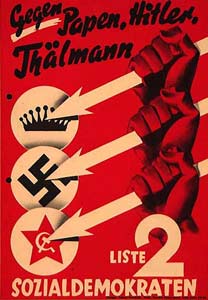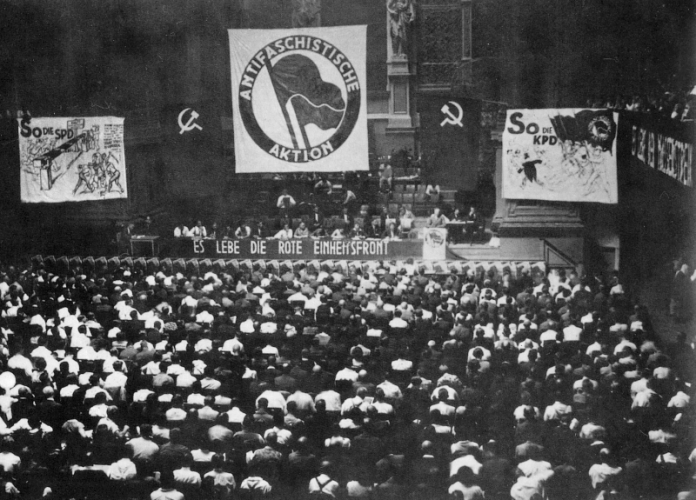Throughout the early 1930s, the Nazis kept getting stronger. In the elections of 1930 their vote count had increased six-fold, to eighteen percent. By mid-1932 it was already 37 percent.
But the Nazis weren’t primarily focused on elections. With increasing frequency, they were assaulting and murdering their opponents. Every organization in Germany’s workers movement was under threat of direct Nazi attack: labor unions, the Social Democratic Party (SPD) and the Communist Party (KPD).
A unified resistance among workers could have defeated the Nazis. We must not forget that in the 1933 elections, the SPD and KPD together received more votes than Hitler.
But coordinated antifascist action was absent. The SPD called the KPD “fascists painted red” and “Kozis.” The KPD called the SPD “social fascists.” And both parties gave no quarter: linking up with fascists in order to fight other fascists was out of the question.
So how did they think they could defend themselves from the Nazi threat? The SPD assumed that the state, the Weimar constitution, and the police would protect them. The KPD, on the other hand, actively fought the gangs of the Sturmabteilung (the brownshirts, or SA)—under the impression that they alone, as a radical minority, could stand the Nazis down.
What does “United Front” mean?

Pictured here on a 1932 campaign poster, the three arrows are still used by many anarchist groups like RASH and by Antifa chapters; their origin is in the banners of the social democrats’ Iron Front. They signify the SPD’s orientation against monarchists, fascists, and communists.
Both parties were wrong. A real united front against fascism was needed. A united front would mean: “March separately, strike together!” In other words, everyone can stick to and promote their own program, but when it comes to action, you work in concert.
The SPD and KPD had enormous differences. The SPD was still trying to manage and administer capitalism, which was in deep crisis. The KPD wanted socialist revolution. Still, they could have coordinated on concrete actions. A communist worker could have said to her social democratic colleague: “The politics of our parties are incompatible, but when the fascists come tonight to destroy your organization’s offices, I will come, weapon in hand, to your aid. Will you also promise to help when my organization is attacked?”
Many people recognized the threat of fascism and called for such a united front. But both the SPD and KPD refused. Instead, they created pseudo-united groups—among themselves. The SPD had the Eiserne Front (“Iron Front”), composed of SPD-led labor unions and some liberals. They depended, ultimately, on the bourgeois police to fight the Nazis.
The KPD founded Antifaschistische Aktion (Antifascist Action). Officially, it was open to anyone, ostensibly also SPD members—but they had to be able to accept Antifascist Action’s attacks on the SPD. It was taken for granted that SPD members would leave their party before joining Antifascist Action. It didn’t work out that way.
Even then, the SPD was already a corrupt capitalist party—but it was still the party with the most organized workers on the ground in Germany. Without their members, the fight against the Nazis was unwinnable.
This fractured politics persisted until 30 January 1933, when the German elites transferred power to Hitler. After that, the greatest workers movement in the world was crushed by the SA and the police. Unions were banned, along with both the KPD and the SPD, with hardly a shot fired. A defeat without a fight is the worst kind of defeat. As the saying goes, the workers movement remained fractured “until social democrats and communists finally found common ground—in a concentration camp.”

The KPD’s Antifascist Action in 1932: purportedly a “united front” which disdained the SPD first and foremost—the lefthand banner pictured here ridicules them. This did not win any SPD workers over to the common struggle.
What can we learn from this today?
We cannot rely on the state to fight the radical right for us.
We need broad, mass actions against fascism—demonstrations, blockades, getting active yourself.
This struggle cannot be waged by a limited radical minority alone. Every organization of the workers movement must be called upon to actively mobilize their members—of course the labor unions, but also die Linke and the SPD.
Because when Nazis arrive by train for their demonstration, two hundred Antifas can block the tracks—or one train conductor could refuse to transport Nazis. Two hundred Antifas can stop a deportation with blockades at an airport—a single airline pilot refusing to take off could achieve the same. Indeed, the latter is happening more and more. But it is only by organizing these workers that such actions can be effectively planned and coordinated. Only workers have the power to carry out the social and democratic demands of the exploited and oppressed.
Translated and first published in English by Antidote











